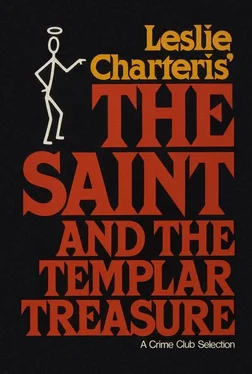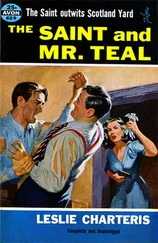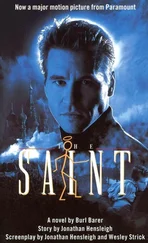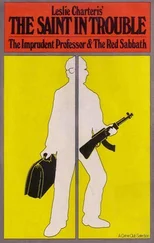“Then why did he run when the Allies took Paris?”
“He was in the middle. Not many people knew of his work. He had to go to ground until his name was cleared. Only a few collaborators ever got to trial,” Louvois added pointedly.
“You don’t know anything about what he has been doing since the war ended, I suppose,” asked the Saint hopefully.
“A wealthy man, I believe,” Louvois replied. “I think he has several successful businesses, but I could find out more if you like.”
“I’d be very grateful. Can I phone you again after lunch? Also anything on his assistant, Henri Pichot.”
“Bien volontiers. I will see what I can do.”
The Saint emerged from the gloom of the post office and went in search of sustenance. A stroll down the Rue de la Republique brought him to the only restaurant listed in his edition of the Guide Michelin, the Univers, a modest but comfortable hostelry overlooking the Place Aristide Briand, on the perimeter of the old town. He enjoyed an eminently satisfying meal of pâté maison followed by a robustly garlicked preparation of tripes for which he had an uninhibited affection, but in the interests of dental hygiene eschewed a toffee-flavoured dessert which paid tribute to the town’s traditional product. He took his time to finish the bottle of ice-cold rose which he had ordered at the beginning of the repast, until he estimated that it was not too soon for a leisured return to the Place d’Inguimbert and his second call to Antoine Louvois.
Again he wrote down the number and waited until the clerk announced that despite the efforts of the French telephone system his call had been connected.
“Any luck?” Simon asked as soon as he was put through.
This time he did not have to identify himself.
“A little,” Louvois replied guardedly. “Florian owns a couple of factories, light engineering. He started after the war with a small government contract and never looked back. Recently bought into a chain of American-style snack bars, they’re doing well too.”
“Quelle horreur!” said the Saint, with feeling. “But does anything shady seem to be involved?”
“Nothing you could be definite about. There was talk that his government contracts were payment for something someone didn’t want made public, probably to do with the war. And I’m told that some of his financial dealings have been pretty close to the borderline. He got into the snack business after a couple of fires almost bankrupted the company. There is always gossip when things like that happen.”
“And Pichot?”
“Apparently he handles the legal side for Florian. Very sharp and very ambitious, so I’m told. Lives well, too. An apartment near the Étoile, likes his nights out in the best places, and has a petite amie with expensive tastes.”
The Saint thought of Jeanne Corday and smiled.
“Thanks, that’s enough for now. Antoine, you have been a great help.”
“Are you in trouble, Simon?”
Simon laughed.
“Nothing I can’t handle, mon pôte. Next time I’m in Paris I’ll tell you all about it.”
“I shall look forward to it.”
“Moi aussi.”
He walked back to the garage with a new lightness in his step. The information he had gleaned was nothing substantial but it had been just enough to brush away some of the cobwebs of theories that had hampered him. He was in no hurry to return to Ingare. His next move was already decided upon, and that was not scheduled until later in the day.
The Mercedes was in the workshop, a pathetically crumpled appendage to the crane on the breakdown truck. After a long silent survey, the Saint was able to make his own painful prognosis.
“Maybe we could sell it to some art gallery as a piece of modern sculpture,” he said.
“It could perhaps be completely rebuilt,” the garagiste told him hopefully.
“You had better keep it until Monsieur Florian decides what is to be done with it,” said the Saint.
He paid his bill and added a generous tip, and pointed the Hirondel back towards Château Ingare.
His return journey was undertaken at a conservative pace, and the first shades of evening were spreading across the hillside by the time he retraced the rough road by which he had first entered the domaine. A group of workmen were standing talking beside the burnt-out barn, but as the Saint passed their conversation ceased abruptly, and they watched him in sullen silence as he drove on to the château.
Mimette was talking to the watchdog gendarme at the top of the steps outside the front door as Simon braked to a halt, which happily solved a couple of potential problems. She smoothly suppressed any visible surprise at his return in a different car, as if in any case his day-long absence was nothing remarkable, and went in with him through the hall to the salon.
Only there did she say: “You have a lot to tell me.”
The Saint helped himself to a Scotch of the generous proportions that he felt his day had earned him.
“It’s going to be a bit harder,” he said, “to tell your father about his precious Merc.”
As he undramatically related the day’s events, the revelation of Philippe’s wartime activities shook her only slightly less than the sabotaging of the car.
“You could have been killed,” she said.
“I almost was. And your father certainly would have been.”
“You saved his life.”
“Pas du tout. I wrecked his car.”
She bowed her head with a barely perceptible shudder.
“It doesn’t make sense,” she said at last. “Why should anyone want to kill my father?”
“No Yves, no Ingare,” Simon answered succinctly. “Whoever did it knew that your father always went to that Confrérie lunch on the same day every week. The fact that he didn’t go today, and I borrowed the car, was unfortunate — for them.”
“And Philippe, why did he not tell his own family what he had done? Why did he allow us to think he was a collaborator?”
“Perhaps you never gave him the chance,” suggested the Saint. “I’m not as surprised as you. The way he helped me get Gaston out of the vat made me think that he’d dealt with death before. In my experience, collaborators don’t usually have such strong stomachs.”
“But if Philippe isn’t — what I thought he was... then it must be someone else who’s behind all the trouble we’ve been having here.”
He shook his head slowly.
“Au contraire. Unhappily, even a war hero isn’t necessarily an angel. What I wanted to check on was what Philippe might have on his conscience that would make him so very eager to get me out of the picture. And it seems that since he was able to return to Paris his operations have been on the sharp side, to say the least. Exactly how sharp, we don’t know. But the report I got seems to show that he could still be a double-dealer. So instead of being ruled out, he’s still very much ruled in.”
“Then what can we do now?” she asked despondently.
Simon consulted his watch, and finished his drink. He stood up and stretched himself catlike.
“Personally, I’m going to do a little exploring before dinner,” he told her cheerfully, and made a quick exit before she could press him further.
Back in his room, he changed quickly into the trousers which had been expendably damaged on his arrival, changed also into a pair of light but sturdy sneakers, and slipped into his hip pocket the flashlight which was as indispensable a part of his travelling necessities as the ordinary man’s razor.
He left the château by the front door, with a nonchalantly affable wave to the gendarme standing there, who by this time seemed to have graduated from bewilderment to boredom with his comings and goings and changes of vehicle and costume. He headed around the side and downhill to the outbuilding where the late Gaston Pichot had fallen into the Hecate crypt.
Читать дальше












